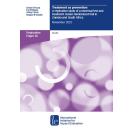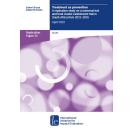Biometric Smartcards and payment disbursement: a replication study of a state capacity-building experiment in India
3ie Replication paper 23, 2019
The National Rural Employment Guarantee Scheme and Social Security Pension are two of the largest employment programmes in Andhra Pradesh. Muralidharan and colleagues (2016) investigated the impacts of biometrically-authenticated payment infrastructure (Smartcards) on beneficiaries of the two employment programmes. Using a large-scale randomised experiment, the original study finds that Smartcards decrease the time lag for recipients to receive funds, reduce leakages of benefits (i.e. corruption) and increase enrolment rates in the two programmes.
The replication authors provide additional analysis on the potential returns from government investment in technological infrastructure to improve public service delivery, effectively disburse payments and achieve better welfare outcomes. They used push-button and pure replications that reproduced results without modifying the data, models and codes provided by the original authors. The replication researchers performed additional robustness checks in their measurement and estimation analysis. They also explored additional hypotheses in their theory of change to identify moderating factors that contribute to the heterogeneous effects of biometric Smartcards in India. Overall, the replication study confirmed that the gains from state capacity investment are worthwhile for policymakers’ consideration.

